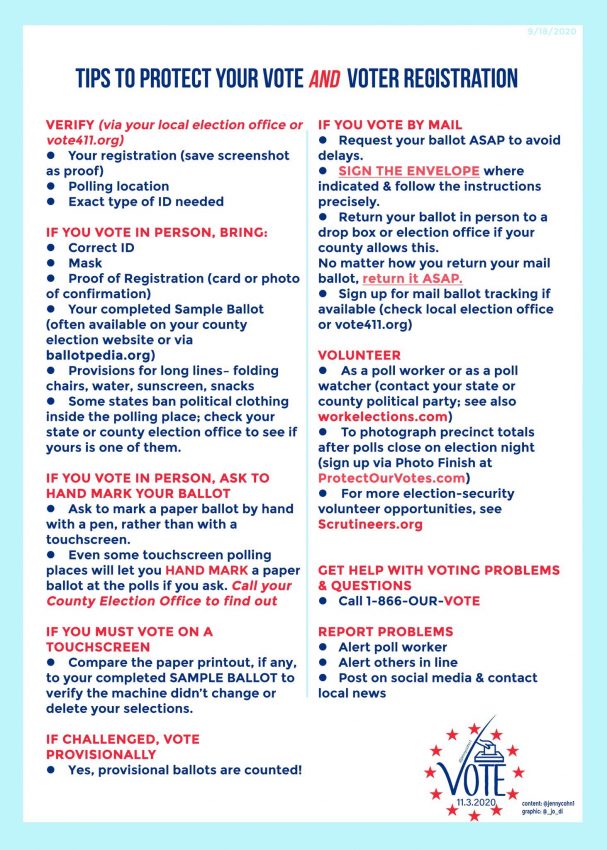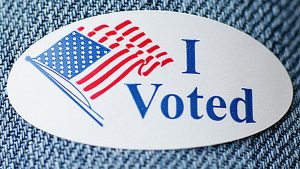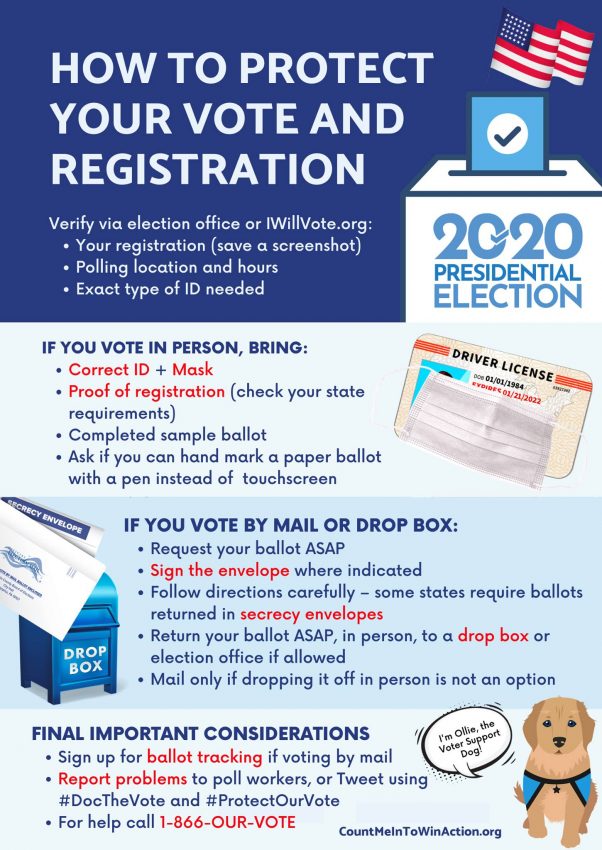 Use the links below to find information about upcoming elections in the U.S.: primaries and general elections, as well as any special elections or runoffs for your state, county/municipality, or congressional district.
Use the links below to find information about upcoming elections in the U.S.: primaries and general elections, as well as any special elections or runoffs for your state, county/municipality, or congressional district.
Please verify that you are still registered to vote via your Secretary of State’s election division or your County’s elections office (click on one of the top links under your state name, below). Ideally, check your status at least once before each election, preferably more than a month before election day, so that you still have time to correct any problems. Confirm that all of your registration information (name, address, party preference, SS/ID #) is correct and current (i.e., it hasn’t been purged or altered). If you have moved since you last registered, you need to re-register to vote.
Also follow the groups listed in this post on social media for ongoing updates, and please share voting links and info. for your state with your friends (online and off). Many states have changed the dates of their primaries (and Early Voting periods), or are changing their rules related to absentee/mail-in ballots. Periodically check for and spread the word about any changes!
To start off, here are some general resources that are useful for people across the United States. For more specific, state-by-state information and links, scroll down to the next section to find your state (listed in alphabetical order).
General/Nationwide Resources:
Also see (and subscribe to) our Twitter list of Voting-related groups and experts
Our other voting posts include additional links and suggestions:
State-specific Election/Voting Links:
In addition to using the links provided under your state name (below), be sure to look up your County’s Elections office/Registrar/Board. You can contact them (or your Secretary of State’s office) to verify that you’re still correctly registered, and to ask questions about current voting rules, local polling places, etc. You could also contact them to inquire about serving as a poll worker, and/or to request that the county/state provide hand-marked paper ballots rather than touchscreen voting machines (which are not nearly as secure or accurate).
Also do a search in your web browser or on social media (e.g. Twitter or Facebook) to look up the sites/pages for your state’s chapters of: the League of Women Voters, Common Cause, Indivisible, Sierra Club, League of Conservation Voters, Democratic Party, ACLU, All on the Line, and any Fair Elections/Fair Maps/Fair Districts/Redistricting (anti-gerrymandering) groups in your state.
Use one of first 3 links under your state name to look up when your state’s voter registration deadlines are (some states allow Same-Day/election-day registration), and to find out if your county/state allows Early Voting (and if so, when/where) or Absentee/Mail-In Ballots so you can avoid any lines, obstacles, or risks on Election Day.
ALABAMA
Also see the recommendations provided at the beginning of the State-specific section of this post (immediately above the Alabama heading).
ALASKA
Also see the recommendations provided at the beginning of the State-specific section of this post (immediately above the Alabama heading).
ARIZONA
Also see the recommendations provided at the beginning of the State-specific section of this post (immediately above the Alabama heading).
ARKANSAS
Also see the recommendations provided at the beginning of the State-specific section of this post (immediately above the Alabama heading).
CALIFORNIA
Also see the recommendations provided at the beginning of the State-specific section of this post (immediately above the Alabama heading).
COLORADO
Also see the recommendations provided at the beginning of the State-specific section of this post (immediately above the Alabama heading).
CONNECTICUT
Also see the recommendations provided at the beginning of the State-specific section of this post (immediately above the Alabama heading).
DELAWARE
Also see the recommendations provided at the beginning of the State-specific section of this post (immediately above the Alabama heading).
FLORIDA
Also see the recommendations provided at the beginning of the State-specific section of this post (immediately above the Alabama heading).
GEORGIA
Also see the recommendations provided at the beginning of the State-specific section of this post (immediately above the Alabama heading).
HAWAII
Also see the recommendations provided at the beginning of the State-specific section of this post (immediately above the Alabama heading).
IDAHO
Also see the recommendations provided at the beginning of the State-specific section of this post (immediately above the Alabama heading).
ILLINOIS
Also see the recommendations provided at the beginning of the State-specific section of this post (immediately above the Alabama heading).
INDIANA
Also see the recommendations provided at the beginning of the State-specific section of this post (immediately above the Alabama heading).
IOWA
Also see the recommendations provided at the beginning of the State-specific section of this post (immediately above the Alabama heading).
KANSAS
Also see the recommendations provided at the beginning of the State-specific section of this post (immediately above the Alabama heading).
KENTUCKY
Also see the recommendations provided at the beginning of the State-specific section of this post (immediately above the Alabama heading).
LOUISIANA
Also see the recommendations provided at the beginning of the State-specific section of this post (immediately above the Alabama heading).
MAINE
Also see the recommendations provided at the beginning of the State-specific section of this post (immediately above the Alabama heading).
MARYLAND
Also see the recommendations provided at the beginning of the State-specific section of this post (immediately above the Alabama heading).
MASSACHUSETTS
Also see the recommendations provided at the beginning of the State-specific section of this post (immediately above the Alabama heading).
MICHIGAN
Also see the recommendations provided at the beginning of the State-specific section of this post (immediately above the Alabama heading).
MINNESOTA
Also see the recommendations provided at the beginning of the State-specific section of this post (immediately above the Alabama heading).
MISSISSIPPI
Also see the recommendations provided at the beginning of the State-specific section of this post (immediately above the Alabama heading).
MISSOURI
Also see the recommendations provided at the beginning of the State-specific section of this post (immediately above the Alabama heading).
MONTANA
Also see the recommendations provided at the beginning of the State-specific section of this post (immediately above the Alabama heading).
NEBRASKA
Also see the recommendations provided at the beginning of the State-specific section of this post (immediately above the Alabama heading).
NEVADA
Also see the recommendations provided at the beginning of the State-specific section of this post (immediately above the Alabama heading).
NEW HAMPSHIRE
Also see the recommendations provided at the beginning of the State-specific section of this post (immediately above the Alabama heading).
NEW JERSEY
Also see the recommendations provided at the beginning of the State-specific section of this post (immediately above the Alabama heading).
NEW MEXICO
Also see the recommendations provided at the beginning of the State-specific section of this post (immediately above the Alabama heading).
NEW YORK
Also see the recommendations provided at the beginning of the State-specific section of this post (immediately above the Alabama heading).
NORTH CAROLINA
Also see the recommendations provided at the beginning of the State-specific section of this post (immediately above the Alabama heading).
NORTH DAKOTA
Also see the recommendations provided at the beginning of the State-specific section of this post (immediately above the Alabama heading).
OHIO
Also see the recommendations provided at the beginning of the State-specific section of this post (immediately above the Alabama heading).
OKLAHOMA
Also see the recommendations provided at the beginning of the State-specific section of this post (immediately above the Alabama heading).
OREGON
Also see the recommendations provided at the beginning of the State-specific section of this post (immediately above the Alabama heading).
PENNSYLVANIA
Also see the recommendations provided at the beginning of the State-specific section of this post (immediately above the Alabama heading).
RHODE ISLAND
Also see the recommendations provided at the beginning of the State-specific section of this post (immediately above the Alabama heading).
SOUTH CAROLINA
Also see the recommendations provided at the beginning of the State-specific section of this post (immediately above the Alabama heading).
SOUTH DAKOTA
Also see the recommendations provided at the beginning of the State-specific section of this post (immediately above the Alabama heading).
TENNESSEE
Also see the recommendations provided at the beginning of the State-specific section of this post (immediately above the Alabama heading).
TEXAS
Also see the recommendations provided at the beginning of the State-specific section of this post (immediately above the Alabama heading).
UTAH
Also see the recommendations provided at the beginning of the State-specific section of this post (immediately above the Alabama heading).
VERMONT
Also see the recommendations provided at the beginning of the State-specific section of this post (immediately above the Alabama heading).
VIRGINIA
Also see the recommendations provided at the beginning of the State-specific section of this post (immediately above the Alabama heading).
WASHINGTON
Also see the recommendations provided at the beginning of the State-specific section of this post (immediately above the Alabama heading).
WEST VIRGINIA
Also see the recommendations provided at the beginning of the State-specific section of this post (immediately above the Alabama heading).
WISCONSIN
Also see the recommendations provided at the beginning of the State-specific section of this post (immediately above the Alabama heading).
WYOMING
Also see the recommendations provided at the beginning of the State-specific section of this post (immediately above the Alabama heading).
Washington, D.C.
Puerto Rico
I really hope you will use and share some of the links provided in this post. And please vote in every election. Democracy is not a spectator sport, and our freedoms are not guaranteed. Unfortunately, it’s become painfully clear that if we take our democracy and our rights for granted and we don’t use (and assert) our rights, we are going to lose them.
Also see (and subscribe to) our Twitter list of State and Local Dem groups, and our Twitter list of Voting-related groups and experts.
Our other voting posts include additional links and suggestions:

February 21, 2020
 For the love of all that is good; for the sake of a habitable planet with a survivable climate, for the sake of democracy and voting rights, for the sake of our personhood, bodily autonomy, self-determination, and fundamental rights and civil liberties, for the sake of reducing the threat of gun violence, for the sake of children and the future of humanity; to protect Social Security and Medicare for elders and people with disabilities; to protect LGBTQ people and immigrants/refugees and every marginalized and dehumanized group; and for so SO many other reasons I shouldn’t have to list here: PLEASE (yes, I’m begging), please vote, and also do something to help Get Out the Vote and get people you know to vote (Blue) in the upcoming elections and in all elections—especially young people or others who may not have voted before (or who have moved and need to re-register) and people who live in swing/”purple” or “red” states or districts. Help them get registered; they might just need a little nudge or a link or a form. Then take them with you to vote or to drop off your signed mail-in ballots.
For the love of all that is good; for the sake of a habitable planet with a survivable climate, for the sake of democracy and voting rights, for the sake of our personhood, bodily autonomy, self-determination, and fundamental rights and civil liberties, for the sake of reducing the threat of gun violence, for the sake of children and the future of humanity; to protect Social Security and Medicare for elders and people with disabilities; to protect LGBTQ people and immigrants/refugees and every marginalized and dehumanized group; and for so SO many other reasons I shouldn’t have to list here: PLEASE (yes, I’m begging), please vote, and also do something to help Get Out the Vote and get people you know to vote (Blue) in the upcoming elections and in all elections—especially young people or others who may not have voted before (or who have moved and need to re-register) and people who live in swing/”purple” or “red” states or districts. Help them get registered; they might just need a little nudge or a link or a form. Then take them with you to vote or to drop off your signed mail-in ballots.


 Over the past 10-15 years, it’s felt like new, large-scale crises emerge almost every day. It’s hard to focus on or prioritize any one issue, as so many issues are of dire importance.
Over the past 10-15 years, it’s felt like new, large-scale crises emerge almost every day. It’s hard to focus on or prioritize any one issue, as so many issues are of dire importance. We all have so many personal responsibilities and daily struggles and stressors of our own that it can be very hard to take in what’s going on in other people’s lives and in other parts of the world. Many people turn away because they are already overwhelmed and are in survival mode, and simply can’t cope with or absorb any more sad or scary news or more problems that seem intractable; we all go through certain periods of our lives, or parts of our days, when our own problems (or our families’) are all (or more than) we can handle. Taking on the weight of the world can be crushing. Almost none of us are unscathed or truly OK these days, as most of us are facing numerous challenges at societal and individual levels. It’s important to “put your own oxygen mask on first, before helping others with theirs” because you can’t help others unless you are alive, relatively sane and healthy, and able to function. But whenever we do have the capacity, we should strive to be compassionate, stay aware of what is going on outside of our immediate lives and circumstances, and try to make a difference whenever and wherever we can, however small our efforts may seem, on whatever specific issue(s) we feel we can make an impact on. Helping others (and humanity at large) also gives our own lives a greater sense of meaning and purpose.
We all have so many personal responsibilities and daily struggles and stressors of our own that it can be very hard to take in what’s going on in other people’s lives and in other parts of the world. Many people turn away because they are already overwhelmed and are in survival mode, and simply can’t cope with or absorb any more sad or scary news or more problems that seem intractable; we all go through certain periods of our lives, or parts of our days, when our own problems (or our families’) are all (or more than) we can handle. Taking on the weight of the world can be crushing. Almost none of us are unscathed or truly OK these days, as most of us are facing numerous challenges at societal and individual levels. It’s important to “put your own oxygen mask on first, before helping others with theirs” because you can’t help others unless you are alive, relatively sane and healthy, and able to function. But whenever we do have the capacity, we should strive to be compassionate, stay aware of what is going on outside of our immediate lives and circumstances, and try to make a difference whenever and wherever we can, however small our efforts may seem, on whatever specific issue(s) we feel we can make an impact on. Helping others (and humanity at large) also gives our own lives a greater sense of meaning and purpose.






